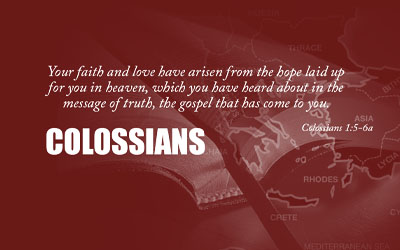Colossians 1:11-22
Empowered for patience, steadfastness, and thankfulness. Delivered from darkness. Christ’s preeminence. Enemy of God. Reconciled with God.
(Bấm vào đây để đọc tiếng Việt)
PATIENCE, STEADFASTNESS, and THANKFULNESS
 This Sunday, we continued to study Colossians from verses 11 to 22 of chapter 1: "9For this reason we also, from the day we heard about you, have not ceased praying for you and asking God to fill you with the knowledge of his will in all spiritual wisdom and understanding, 10so that you may live worthily of the Lord and please him in all respects – bearing fruit in every good deed, growing in the knowledge of God, 11being strengthened with all power according to his glorious might for the display of all patience and steadfastness, joyfully 12giving thanks to the Father who has qualified you to share in the saints’ inheritance in the light."
This Sunday, we continued to study Colossians from verses 11 to 22 of chapter 1: "9For this reason we also, from the day we heard about you, have not ceased praying for you and asking God to fill you with the knowledge of his will in all spiritual wisdom and understanding, 10so that you may live worthily of the Lord and please him in all respects – bearing fruit in every good deed, growing in the knowledge of God, 11being strengthened with all power according to his glorious might for the display of all patience and steadfastness, joyfully 12giving thanks to the Father who has qualified you to share in the saints’ inheritance in the light."
The qualities mentioned in verse 11 above are bestowed upon us as a result of God’s strength. But how does God strengthen us? By giving us “the hope laid up for us in heaven,” as we heard the gospel (Colossians 1:5).
There are times in a believer’s life when the joy seems to have faded. However, verse 11 in bold-red above may help us reorient our compass in order to find that joy again. It is the hope of heaven, a reminder of the time when we were first touched by God’s love and realized His forgiveness of our sins, that has rescued us from our hopeless situation. I’m sure this was the experience and testimony of those who were delivered from the clutches of the law under the Old Covenant.
DELIVERANCE
“13He delivered us from the power of darkness and transferred us to the kingdom of the Son he loves,14in whom we have redemption, the forgiveness of sins. (Colossians 1:13-14)
The most powerful weapon against the power of darkness is the forgiveness of our sins. We lived under tremendous guilt and condemnation before we were forgiven. We have peace with God now that we have been forgiven, which allows us to have peace within our soul.
Another critical point to emphasize here is “He delivered us.” We failed to deliver ourselves. We didn’t get away. We didn’t somehow rise above our situation as condemned sinners. We were thrashing around in the ocean of our misery, but we were nowhere near the calm shore.
Furthermore, God has already taken the action of delivering us from the darkness. It’s finished, just as Jesus said before taking his last breath on the cross. You’re not on your way out of a long, dark tunnel, getting closer to the light with each passing day, but you have been “delivered.” Your salvation is assured.
What significance does this fact have? It is because it affects our lives as Christians and how the gospel is communicated to others within our sphere of influence.
THE PREEMINENCE OF CHRIST
“15He is the image of the invisible God, the firstborn over all creation, 16for all things in heaven and on earth were created in him – all things, whether visible or invisible, whether thrones or dominions, whether principalities or powers – all things were created through him and for him. 17He himself is before all things and all things are held together in him. 18He is the head of the body, the church, as well as the beginning, the firstborn from the dead, so that he himself may become first in all things. 19For God was pleased to have all his fullness dwell in the Son 20and through him to reconcile all things to himself by making peace through the blood of his cross – through him, whether things on earth or things in heaven. (Colossians 1:15-20)
So far, we’ve learned that we were “strengthened with all power according to his glorious might” in verse 11, and that God saved us in verses 13 and 14. And here, from verses 15 to 20, Paul asserts Christ’s exclusivity as the Alpha and Omega of everything, from the beginning to the end of our faith.
He created us from nothing, then came into the world and died for our sins to restore our broken relationship with God. So, what is our role in this salvation? Nothing. We owe him everything. There is nothing left for us to boast about in God’s plan of redemption except that we believe in the One who died for our sins.
ENEMIES AND STRANGERS TO GOD
“21And you were at one time strangers and enemies in your minds as expressed through your evil deed. (Colossians 1:21)
We have a tendency to believe that our becoming strangers and enemies to God was the result of our “evil deeds.” Nothing could be further from the truth. Our sin nature is what makes us enemies of God. Evil deeds are simply the fruit of that nature.
If our evil deeds are the cause of our separation from God, then we should be able to reconcile with God simply by ceasing to sin. The truth is that we are born enemies of God before we have ever done anything wrong.
“Yet death reigned from Adam until Moses even over those who did not sin in the same way that Adam (who is a type of the coming one).” (Romans 5:14)
If the primary goal of a Christian is to stop sinning, we’re doing the impossible because no matter how hard we try, we’d never get any closer to God. But instead, we should come and rest in the finished work of Christ at the cross and let the Spirit of God bear fruit in our lives.
RECONCILED WITH GOD
“22… but now he has reconciled you by his physical body through death to present you holy, without blemish, and blameless before him. (Colossians 1:22)
What role did you play in God’s reconciliation? What punishment or penance did you receive for your transgressions? What do you intend to offer Him as a peace offering? None of the preceding.
Verse 22 explains it clearly: “he has reconciled you by his physical body through death.” Furthermore, it is a perfect reconciliation because it is capable of “presenting you holy, without blemish, and blameless before him.” Only God can do that.
Nghi Nguyen
- Scripture quoted by permission. All scripture quotations, unless otherwise indicated, are taken from the NET Bible® copyright ©1996-2006 by Biblical Studies Press, L.L.C. All rights reserved.
Disclaimer: This is my own opinion on the topic, which does not necessarily reflect the church's theology, or beliefs of the individuals in it — Nghi Nguyen
